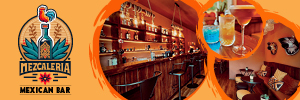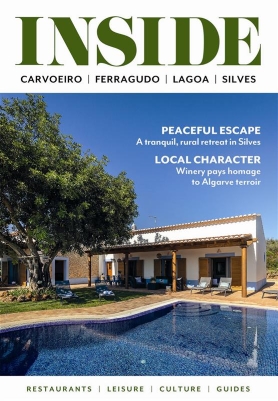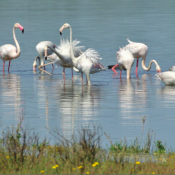
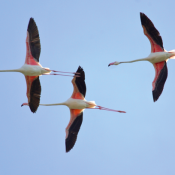
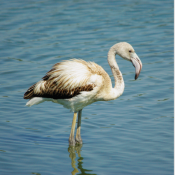
Next to the bee-eater and hoopoe, the flamingo, also referred to as the greater flamingo, is one of the exotic birds visitors to the Algarve would most like to see
Until the 1980s, there were hardly any flamingos in the western part of the Algarve. Nowadays, this somewhat grotesque, but also elegant-looking large bird, can be observed at various locations.
Since this species prefers brackish water or salt water, larger groups are most likely to be found in the saltwater lagoons or salt production fields of the Ria Formosa Nature Park. Yet, for much of the year, flamingos can also be seen in the large Lagoa dos Salgados lagoon, with numbers sometimes reaching up to three hundred birds. Sometimes you can spot flamingos resting in the Arade estuary, when you cross the large bridge over the River Arade.
The Camargue, in the South of France, the Coto Doñana Nature Park, in Southern Spain, and the Po Delta, in Northern Italy, are home to the best-known breeding colonies in Southern Europe. Flamingos mostly breed in dense colonies, building thirty-centimetre-high nests out of mud, with room for one to two eggs.
The greater flamingo’s special filter bill is of particular interest, which is equipped with lamellae, which, together with the tongue, form a filter apparatus. The bill is moved, with the top facing down, over the ground, filtering plankton and small crustaceans, mosquito larvae, molluscs and annelids from the water.
The pink colouring of the plumage is due to the carotenoids contained in their food. These create pigments which accumulate in the skin and feathers of adult flamingos. These large birds provide a great show when flying, but their courtship behaviour is also worth mentioning. Their back feathers bristle up demonstratively as they make threatening gestures. Flamingos often crane their necks up and jerkily lift their wings, with the intense red on shoulders and under-wings showing.
Text and photos: Dr Manfred Temme.









